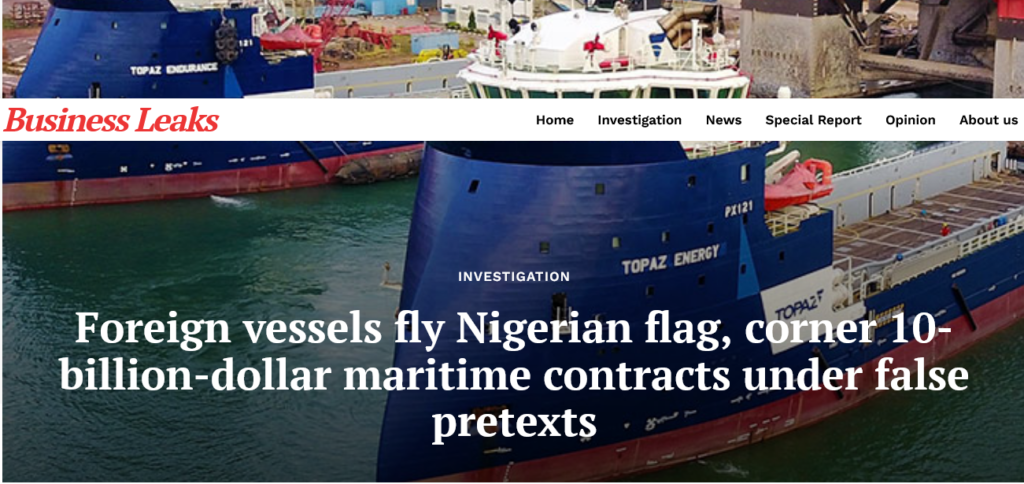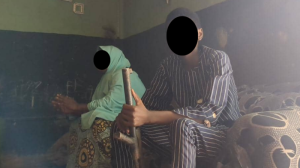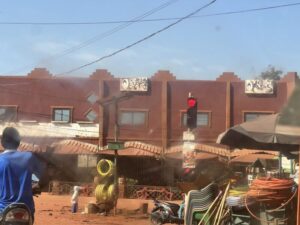By Abiodun Abegunde
Large foreign vessels sailing into the Niger Delta to steal crude oil are certainly not the only way Nigeria loses millions of dollars every day in the oil and gas sector. In a brazen violation of the Nigerian Cabotage and Local Content Act, smaller foreign vessels have infiltrated the country’s coastal and inland waterways, having first obtained questionable local registration and documentation that enable them to fly the Nigerian flag as if they were indigenous vessels.
Lamenting the practice, an industry insider, whose identity is masked for her safety, told BUSINESS LEAKS it is a decade-long malpractice supported by corrupt regulatory officials and big oil and gas companies who prefer to play dumb.
“The best way to explain it to ordinary Nigerians is to imagine a scenario where Turkish Airlines or South Africa Airways or British Airways, instead of restricting themselves to international routes as stipulated by law, decide to paint their aircraft in Nigerian colour and begin to operate local flights from Abuja to Owerri,” the female insider explained.
The Cabotage Act comes with the primary objective to reserve the commercial transportation of goods and services within Nigerian coastal and inland waters to vessels flying the Nigerian flag and owned by persons of Nigerian citizenship.
The Coastal and Inland Shipping (Cabotage) Act No 5 of 2003 Laws of the Federation of Nigeria Act is “to restrict the use of Foreign Vessels in Domestic Coastal Trade”; “to promote the development of Indigenous Tonnage”; and “to establish a Cabotage Vessel Financing Fund and for Related Matters”.
Specifically, the law governs transportation activities within Nigeria’s over 800-kilometres coastline. It covers the carriage of goods and services from one coastal point to another point in Nigeria; the carriage of goods and passengers in the exploration, exploitation or transportation of mineral or non-natural resources; and the operation of a vessel or any other marine activity of a commercial nature – including towage, salvage and dredging – in Nigerian waters in accordance with the Nigerian Maritime Safety and Administration Agency’s (NIMASA) guidelines on its implementation.
Warri Refinery case
BUSINESS LEAKS gathered that in August 2015 an incident was recorded at the Warri Refinery which precipitated a shutdown for three weeks. Vitol, one of the big oil traders operating in Nigeria was a frequent receiver of LPFO allocation from the then PPMC (Pipeline and Product Marketing Company) of the NNPC. LPFO (Low Pour Fuel Oil) is one of the byproducts of crude refining and Vitol had just been allocated 50KT LPFO.
While the Cabotage law requires oil traders to engage local shuttle vessels in evacuating their products, the indigenous vessels are systematically shunned. Explaining further, the female insider said that in addition to building indigenous capacity in the maritime trade, expanding job opportunities and stemming capital flights, the Cabotage law was written with practical purposes in mind.
“Take the LPFO for example, the big vessels that would take the product to final destinations in Europe, Asia or elsewhere cannot get beyond certain points because coastal waters are not deep enough for big ships. And where the water is deep enough, safety rules forbid vessels heavier than 150MTS to sit on LPFO loading berth. So it is local shuttle vessels of 150MTS with maximum LOA (length overall) of 150 metres; sometimes exceptions are made for 158 metres,”she said.
Investigations revealed that rather than charter Nigerian vessels, foreign oil trading companies devise ways to circumvent the law; in the process undermining the Nigerian economy and national interests.
To fulfill all righteousness, agents of the foreign companies would engage Nigerian shuttle vessels but only on paper to secure loading slot; after which they call in a foreign vessel from another country.
For its LPFO, Vitol chartered, two vessels by names MT Leon Herc and M/T Tapti (IMO 91180560) from South America which AIS shipping position at the time was Forteleza in Brazil. Because it took the vessel a long time to get to Nigeria, the Warri Refinery had to shut down and stop production because there was no space left in NNPC storage facility to accommodate new refined products.
The official reason given for the shutdown was routine maintenance. For over three weeks while the shutdown lasted, Nigeria lost hundreds of millions of dollars which would have been avoided had local shuttle vessels been engaged.
BUSINESS LEAKS further gathered that the foreign vessel MT Tapti, was longer than the specified 150 metres LOA. In fact, the LOA of MT Tapti was 183 metres; making it noncompliant with NNPC safety rules and restrictions for LPFO loading berth. MT Tapti was larger and longer and unsuitable for coastal operations. A vessel with higher tonnage specification could cause damage to loading arms.
While loading the LPFO, MT Apati suffered a complete blackout and became grounded for days causing an almost complete blockade of the loading channel which made it difficult for other vessels to manoeuvre. A tugboat finally towed it to a place called Bennet Island.
A 10 billion dollar local market
Renowned maritime lawyer, Emeka Akabogu of Akabogu & Associates estimates the size of Nigeria’s cabotage economy or maritime charter market at USD 10 billion annually. This makes the Nigerian coastal market irresistible to foreign interests; some from as far as Asia and the Middle East.
Akabogu delineated this market to include “an active coastal shipping environment, in which imported petroleum products must be transshipped daily from mother vessels to daughter vessels and moved from offshore locations to Nigerian jetties and terminals; and a robust fleet of offshore support vessels that anchor offshore operations in oil exploration and production.”
Undeterred by the Cabotage law clearly restricting coastal business to vessels wholly owned by Nigerian citizens; vessels wholly manned by Nigerian citizens; vessels registered by Nigerian citizens; and vessels built by Nigerian shipbuilders, foreign operators continue to practice cabotage trade on the nation’s territorial waters, a trade reserved for indigenous operators.
In March this year the Ship Owners Association of Nigeria (SOAN) sent a protest letter to NIMASA, NNPC, and the Nigerian Content Management Development Board (NCMDB) over the activities of foreign-flagged vessels operated by Messrs Unibros/Orion Marine to participate in the domestic shipping of petroleum products solely reserved for Nigerians.
A company called Topaz Energy and Marine Dubai
Aside Messrs Unibros/Orion Marine, inducing the anger of local ship owners, BUSINESS LEAKS uncovered another foreign company by the name Topaz Energy and Marine Dubai.
Topaz is an Emirati company registered in Bemuda, a notorious tax haven, but domiciled in Dubai at Sheikh Zayed Road, Dubai, United Arab Emirates (UAE).
In a bid to operate in Nigeria’s 10-billion-dollar coastal market, Topaz Energy and Marine Dubai registered in Nigeria a company called Team Offshore Nigeria Limited with the address as Atlantic House, 121 Louis Solomon Close, Victoria Island, Lagos. To convince regulators that Team Offshore is an indigenous company, it was registered with two Nigerians, Felicia Mosuro and Ifeyinwa Mogekwu, as directors.

Documents obtained by BUSINESS LEAKS show that soon after registration, the ownership of the supposedly indigenous company, Team Offshore Nigeria changed hands. The two Nigerian directors, Felicia Mosuro and Ifeyinwa Mogekwu on 11th August 2017 relinquished their stakes in the company to two foreigners, Tom Knudsen and Jay Kumar Daga.
Documents from the Corporate Affairs Commission, Form CAC 7A dated 11 August 2017 listed the two foreigners, Tom Knudsen and Jay Kumar Daga , as the only directors of Team Offshore Nigeria Limited.
Tom Knudsen’s residential address was given as Level 58, Almas Tower, Jumeirah Lake Towers, Dubai, United Arab Emirates. Jay Kumar Daga’s residential address was also given as Level 58, Almas Tower, Jumeirah Lake Towers, Dubai, United Arab Emirates. It was not a coincidence that Knudsen and Kumar share the same residential address. Both men at the time were senior employees of Topaz Marine and Energy Dubai, a clear confirmation that Team Offshore is not owned by Nigerians. Jay Kumar Daga holds an Indian nationality. While Knudsen was Director Africa, Jay Daga was the company’s Chief Financial Officer.
At registration, the original directors of Team Offshore Nigeria Limited, the two Nigerians Ifeyinwa Mogekwu and Felicia Mosuro were allotted 3,250,000 and 3,249,999 ordinary shares respectively. Documents show that on 28 September 2017 both women relinquished their shares by transferring same to foreign directors through ADCAX investments Limited. Following the transfer, the shareholding structure of Team Offshore Nigeria Limited became as follows: 6,499,999 (Six million, Four Hundred and Ninety-Nine Thousand, Nine Hundred and Ninety-Nine) ordinary shares to ADCAX Investments Limited and 1 (one) ordinary shares to Felicia Mosuro. It is believed that the Nigerians who acted as proxy directors for the registration were employees of a law firm in Lagos.

Thereafter, about 13 foreign vessels owned by Topaz Marine Dubai were redeployed to Nigerian waters, stripped of their foreign flags and adorned with Nigerian flag. The vessels in Topaz fleet are mostly Platform Support Vessels (PSVs) and anchor handlers. Among them are Topaz Seema, Topaz Faye, Topaz Amani, Topaz Sophie, Topaz Xara, Topaz Jurong, Topaz Captain, Topaz Energy, Topaz Resolve, and Caspian Breeze. These Topaz vessels are known to have been engaged by multinational oil companies such as Mobil, Total and Agip.
Records obtained by BUSINESS LEAKS show that Topaz vessels have been engaged by oil majors in long-term contracts, almost on a daily basis; providing services in Yoho oil field, Agbara Field, Akpo Field and also chartered by oil companies for offshore survey operation. They are: Topaz Sophie (Yoho Field – Mobil), Topaz Captain (Yoho Field – Mobil), Topaz Amani (Yoho Field – Mobil), Topaz Xara (Yoho Field – Mobil), Topaz Endurance (Agbara Field – Agip), Topaz Energy (Akpo Field – Total) and others. The vessels have also been attached to other offshore clients yet to be ascertained.
Indigenous ship owners say each of these vessels make over $18,000 daily on chatter services. The forex are almost entirely repatriated out of the country. Meanwhile local operators who have borrowed money to acquire vessels but cannot find jobs have found their businesses on cliff hangers.
More vessels owned by Topaz Marine Dubai have been found to be operating in Nigeria’s coastal market in similarly subterranean arrangements. The vessel Topaz Amani is listed under CNS Marine Nigeria Limited; Topaz Isra is under Cepsadeen Nigeria Limited while Topaz Seema is listed under Godef West Africa Limited.
The Ship Owners Association of Nigeria (SOAN) say many of its members are under debt burden because the coastal business has been infiltrated by foreign operators that include Indians, Pakistanis, Syrians, Lebanese, and Europeans.
Maritime operator, Iyke Osuagwu, told BUSINESS LEAKS that in addition to suffocating indigenous ship owners, the activities of foreign vessel operators has left in a lurch many Nigerian seafarers, including those trained overseas by NIMASA and their compatriots trained at the Maritime Academy Oron. Local vessels meant to give them employment are themselves gasping for breath.
At an event to mark the 2022 World Seafarers Day in Lagos, a ship captain, Afred Oniye, revealed that over 70 percent of Nigerian seafarers have no jobs. Oniye blamed the situation on corruption and abuse of the Cabotage Act; adding that should regulatory agencies enforce the law, 50 percent of Nigerian seafarers would gain employment.
“So, we are saying, enforce that law that any vessels on Nigerian waters should be Nigerian and not foreign. We have the Cabotage Act that says the ship must be built in Nigeria, manned by Nigerians and crewed by Nigerians. Even if the ship was not built in Nigeria, at least it must be manned by Nigerians,” Captain Oniye said.
The agencies to enforce the Cabotage Act are NIMASA and NCDMB. By extension, the 10-billion-dollar coastal sub-sector is further protected by the Nigerian Oil and Gas Industry Content Development (NOGIC) Act. The aim of the latter is to increase Nigerians’ participation in the oil and gas industry.
Local industry operators dispute NIMASA’s claim that the agency had facilitated the employment of 800 Nigerian seafarers. BUSINESS LEAKS contacted NIMASA but there was no response to our media enquiry demanding the names of the 800 seafarers and the shipping companies they work with.
BUSINESS LEAKS obtained a written response from Topaz sent to the National Assembly defending its activities in Nigeria. Topaz described its relationship with Team Offshore as “strictly contractual in nature”, adding there was “no shareholding interest or joint venture between the parties.”
The Emirati company further added that its relationship with Team Offshore is “governed by a Management and Technical Services Agreement under which Topaz provides certain services to Team Offshore.”
“Team Offshore bareboat charters in vessels from Topaz to conduct its business in Nigeria. To emphasize, Team Offshore is a wholly 100% Nigerian-owned indigenous company and Topaz has no shareholding interest in the company.”
The 17-page response from Topaz was silent on the beneficial ownership of Team Offshore; just as it is silent on all the contentious issues; including accusation of rental of two Nigerians for the purpose of registration to qualify to fly the Nigerian flag; the dispossession of the two Nigerians of their shareholdings as documented with the Corporate Affairs Commission; and the transfers of the same shares to two foreigners who were senior employees of Topaz in Dubai, thus making Team Offshore a 100% foreign company, flying the Nigerian flag under false pretenses.
This investigation was carried out under the Collaborative Media Engagement for Development Inclusivity and Accountability Project of the WSCIJ, with funding from the MacArthur Foundation.
Source: Business Leaks



